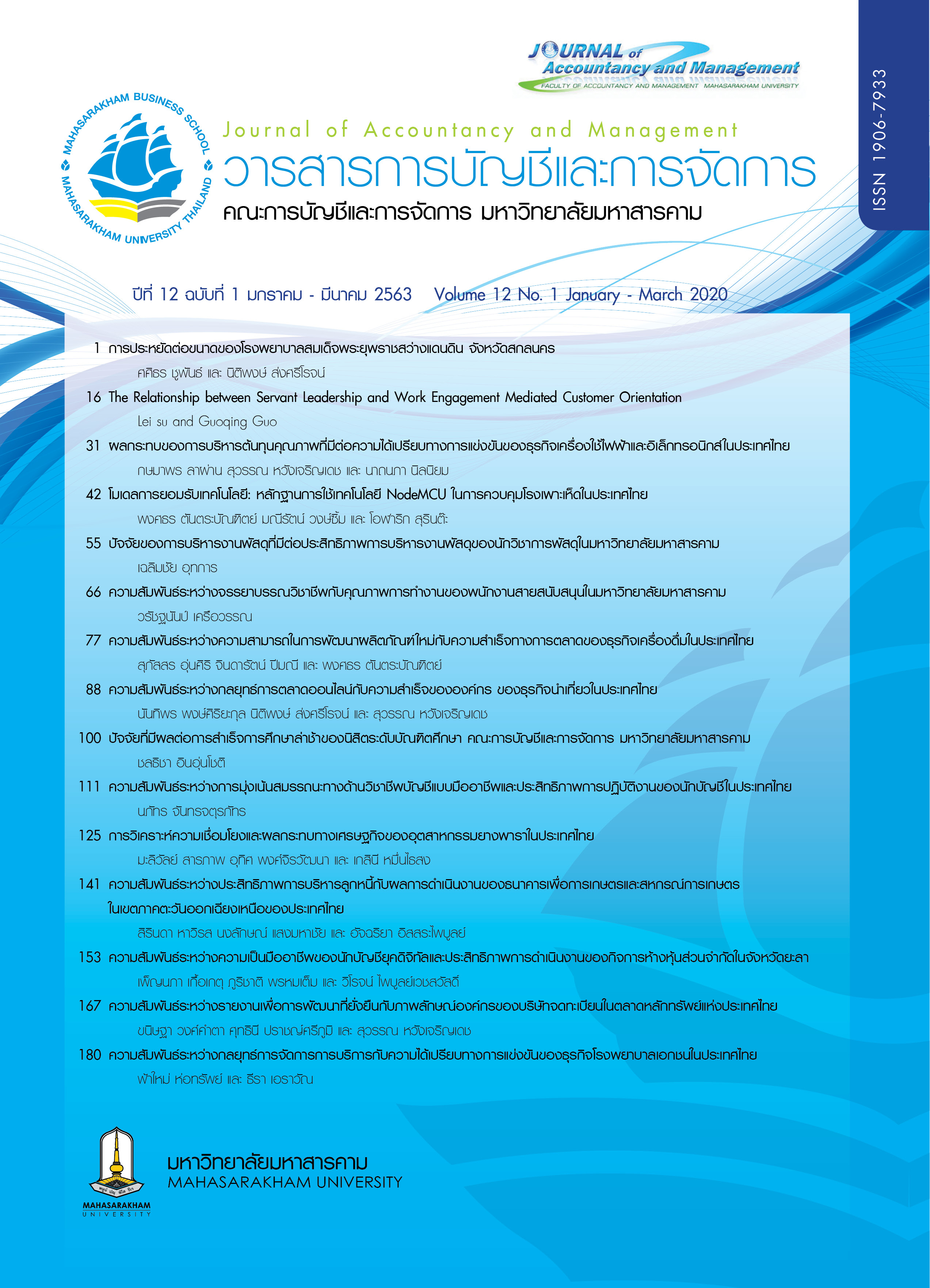โมเดลการยอมรับเทคโนโลยี : หลักฐานการใช้เทคโนโลยี NodeMCU ในการควบคุมโรงเพาะเห็ดในประเทศไทย
Main Article Content
บทคัดย่อ
งานวิจัยนี้มีวัตถุประสงค์เพื่อ (1) พัฒนาเทคโนโลยี NodeMCU ในการควบคุมโรงเพาะเห็ดโดยระบบควบคุมอัตโนมัติและควบคุมโดยมนุษย์ (2) สร้างแอพพิเคชั่น (หรือเครื่องมือที่เกี่ยวกับออนไลน์) ที่สามารถปรับอุณภูมิและความชื้นให้เหมาะสมสำหรับทุกๆ การเจริญเติบโตของเห็ดในแต่ละช่วงเวลาในโรงเห็ดได้ (3) ค้นหาความจริงในการรับรู้การใช้งานเทคโนโลยี NodeMCU ของเกษตรกรโดยใช้โมเดลการยอมรับเทคโนโลยี ฟาร์มเห็ด ”สองพี่น้อง” ถูกเลือกเป็นกรณีศึกษาสำหรับงานวิจัยนี้ หลังจากที่ติดตั้งเทคโนโลยี NodeMCU ในการควบคุมโรงเพาะเห็ดและพัฒนาแอพพิเคชั่นในมือถือสำหรับเกษตรกรแล้ว เทคโนโลยีนี้สามารถรักษาอุณภูมิและความชื้นที่เหมาะสม ให้กับโรงเพาะเห็ดได้โดยการตั้งอัตโนมัติหรือควบคุมโดยเกษตรกรผ่านแอพพิเคชั่นในมือถือ งานวิจัยนี้สามารถอธิบายความตั้งใจที่จะใช้เทคโนโลยี NodeMCU ในการควบคุมโรงเพาะเห็ดในอนาคตได้โดยการประยุกต์ใช้โมเดลการยอมรับเทคโนโลยี
Downloads
Article Details
บทความที่ได้รับการตีพิมพ์เป็นลิขสิทธิ์ของวารสารการบัญชีและการจัดการ
ข้อความที่ปรากฏในบทความแต่ละเรื่องในวารสารวิชาการเล่มนี้เป็นความคิดเห็นส่วนตัวของผู้เขียนแต่ละท่านไม่เกี่ยวข้องกับมหาวิทยาลัยมหาสารคาม และคณาจารย์ท่านอื่นๆในมหาวิทยาลัยฯ แต่อย่างใด ความรับผิดชอบองค์ประกอบทั้งหมดของบทความแต่ละเรื่องเป็นของผู้เขียนแต่ละท่าน หากมีความผิดพลาดใดๆ ผู้เขียนแต่ละท่านจะรับผิดชอบบทความของตนเองแต่ผู้เดียว
เอกสารอ้างอิง
Aldas-Manzano, J., Ruiz-Mafe, C., & Sanz-Blas, S. (2009). Exploring individual personality factors as drivers of M-shopping acceptance. Industrial Management & Data Systems, 109, 739–757. doi: 10.1108/02635570910968018.
Ashton, K. (2009, June 22). That 'Internet of Things' Thing. RFID Journal. Retrieved from https://www.rfidjournal.com/articles/view?4986
Babin, N. (2017). Internet of Things or connected objects. The Internet of Things. Retrieved from https://www.linkedin.com/pulse/internet-things-connected-objects-nicolas-babin-l-i-o-n-/
Behrend, T. S., Wiebe, E. N., London, J. E., & Johnson, E. C. (2011, March–April). Cloud computing adoption and usage in community colleges. Behaviour & Information Technology, 30(2), 231–240.
Bosnjak, M., Obermeier, D. & Tuten, T.L. (2006). Predicting and explaining the propensity to bid in online auction: a comparison of two action-theoretical models. Journal of Consumer Behavior, 5, 102-116.
Davis, F.D. (1989). Perceived usefulness, perceived ease of use, and user acceptance of information technology. MIS Quarterty, 13(3), 319-340.
Davis F.D., Bagozzi R.P., Warshaw P.R. (1989). User acceptance of computer technology: a comparison of two theoretical models. Management Science, 35(8), 982-1003.
Department of Agricultural Extension. (2019). Agricultural Statistics Information, Ministry of Agriculture and Cooperatives, Thailand. Retrieved from https://www.doae.go.th/doae/km_list.php?Cat=SXpUVVF0TGdXb0Y1SlRFOVNBdnhqUT09
Ha, I., Yoon, Y., & Choi, M. (2007). Determinants of adoption of mobile games under mobile broadband wireless access environment. Information & Management, 44(3), 276–286.
Jung, Y., Perez-Mira, B., & Wiley-Patton, S. (2009). Consumer adoption of mobile TV: Examining psychological flow and media content. Computers in Human Behavior, 25(1), 123–129.
Kuo, Y. F., & Yen, S. N. (2009). Towards an understanding of the behavioral intention to use 3G mobile value-added services. Computers in Human Behavior, 25(1), 103–110.
Mallat, N., Rossi, M., Tuunainen, V. K., & Oorni, A. (2009). The impact of use context on mobile services acceptance: The case of mobile ticketing. Information & Management, 46(3), 190–195.
Mariampolski, H. (2001). Qualitative market research: A comprehensive guide. Thousand Oaks, CA: Sage Publications.
Rouse, M. & Bernstein, C. (2019, June). Smart Farming. TechTarget. Retrieved from https://internetofthingsagenda.techtarget.com/definition/smart-farming
Rouse, M., Rosencrance, L., Shea, S. & Wigmore, I. (2019, March). Internet of Things (IoT). TechTarget. Retrieved from https://internetofthingsagenda.techtarget.com/definition/Internet-of-Things-IoT
Shih, Y. & Fan, S. (2013). Adoption of instant messaging by travel agency workers in Taiwan: Integrating technology readiness with the theory of planned behavior. International Journal of Business and Information, 8(1), 120-136.
Shin, D. H. (2009). Understanding user acceptance of DMB in South Korea using the modified technology acceptance model. International Journal of Human–Computer Interaction, 25, 173–198.
Venkatesh, V., & Bala, H. (2008, May). Technology acceptance model 3 and a research agenda on interventions. Decision Sciences, 39(2), 273-315.
Zhou, T. & Lu, Y. (2011). The effects of personality on user acceptance of mobile commerce. International Journal of Human-Computer Interaction, 27(6), 545-561.


